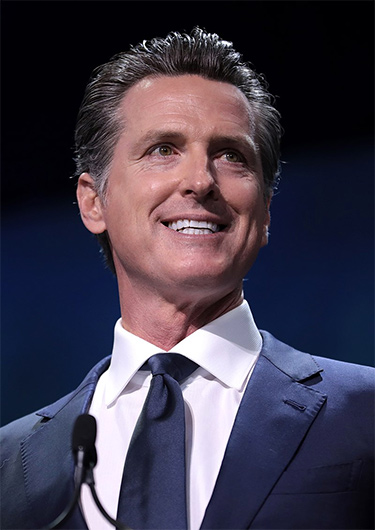By Jim Ellis
May 13, 2021 — The University of California at Berkeley’s Institute for Governmental Studies released another of its periodic polls this week, and while it finds Gov. Gavin Newsom (D) surviving the upcoming recall election it also identifies areas of underlying weakness.According to the survey (April 29-May 5; 10,289 registered California voters with questions asked in English and Spanish, online), Gov. Newsom would win the impending recall vote as 49 percent of the respondents said they would vote to retain him in office and 36 percent support removal. Regarding his job approval and performance on certain issues, however, the poll identifies what could possibly become an opponent’s path to victory.
The Cal-Berkeley result is very similar to another poll conducted within the same time period. Survey USA went into the field during the April 30 – May 2 time segment and interviewed 750 California registered voters of which 642 were identified as likely to vote in the gubernatorial recall election. S-USA found the sampling universe broke 47-36 percent in favor of Gov. Newsom remaining in office, almost identical to Cal-Berkeley’s tally from their much larger online sample.
Cal-Berkeley delved deeper into how the respondent sample was viewing the governor’s job performance and his standing within the electorate, and its results suggest that a focused opposition campaign could yield a close outcome.
Perhaps most troubling to the Newsom strategy team is the question that tested enthusiasm within the electorate. While Democrats were breaking 75-8 percent to retain the governor, the enthusiasm metric showed that only 36 percent of them have a high interest in the election. Another 30 percent fell into a moderate interest level, and 34 percent of the self-identified Democratic voter base said they had little or no interest.
Republicans, on the other hand, registered a 75 percent high interest level, suggesting that their turnout for the eventual election will be much greater. Though Democrats hold a large 46-24 percent party registration advantage, the interest level suggests the eventual election result could fall into a closer range. Among GOP voters, the governor would be ousted in a whopping 85-8 percent margin.
Those registering under the No Party Preference category, who account for another 24 percent of the California voting universe, would retain the governor with a 45-33 percent margin, while the six percent who identify with a minor party break 48-29 percent for removal.
Overall, Gov. Newsom’s job performance improved from Cal-Berkeley’s late January poll and stands at a 52:43 percent positive to negative ratio. In January, the performance ratio was an upside-down 46:48 percent. This is largely due to improvement regarding his handling of the Coronavirus issue, as 45 percent rate his performance as excellent or good, while 35 percent say poor or very poor. Another 16 percent gave him a fair rating, which on this poll seems to indicate a moderate support level as opposed to leaning in a negative direction as some other pollsters characterize the term.

